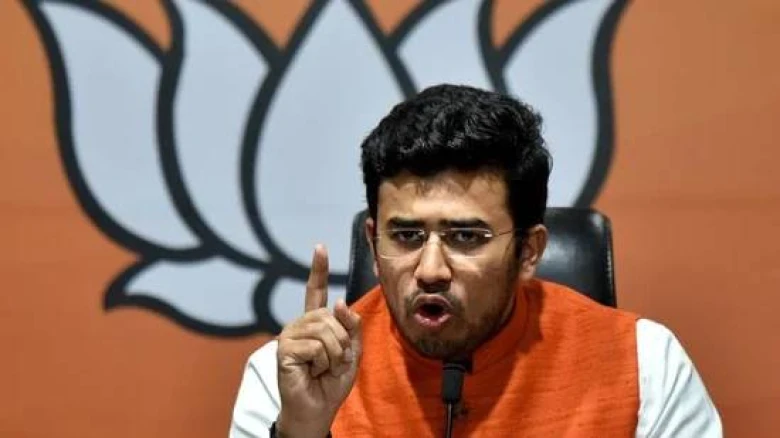National

The next 25 years will determine the peaceful, affluent future of J&K and the rest of Bharat, he said, adding that we are in an advantageous period of history.
color:black;mso-themecolor:text1">
color:black;mso-themecolor:text1">Digital Desk: According to Tejasvi Surya of
the BJP, Article 370 not only poses a constitutional impediment to Jammu and
Kashmir's full integration with India but also a cultural and psychological
one.
color:black;mso-themecolor:text1">The Center repealed Article 370, which gave
the former state of J&K unique status, in August 2019.
color:black;mso-themecolor:text1">The first-ever Tiranga bikers rally from Lal
Chowk to the Kargil War Memorial was flagged off by Surya, the head of the
party's youth branch, who was present.
mso-themecolor:text1">Speaking at the famed "Ghanta Ghar" (clock tower),
Surya declared that after Article 370 was repealed, Kashmir saw progress and
that the valley is now "done with terror."
mso-themecolor:text1">
Kashmir has defeated terrorism and is moving
forward with prosperity. The same Kashmir is now known for its hydro-electric
power projects, new highway, IITs, AIIMS, IIMs, new central universities, and
new development initiatives. We used to hear and read about terrorist assaults,
stone-throwing, and Hurriyat-issued calendars on a daily basis.
He stated, "This is taking place as a result
of Prime Minister Narendra Modi abrogating 370.
A BJP leader claimed that Article 370 was a
psychological and cultural barrier that prevented "us from realising the
constitutional ideal of 'Ek Bharat, Shresth Bharat'."
"When Article 370 was in place,
Kashmir's youth were devoid of any opportunities. They were forced to travel to
Delhi, Pune, and Bengaluru in order to pursue educational prospects. There is
no longer a need to travel beyond Kashmir to receive a world-class education,
he added. "Modi has brought about this metamorphosis."
The Bengaluru South MP further asserted that
the repeal of Article 370 strengthened the position of women and members of the
reserved categories in the Union Territory.
The next 25 years will determine the
peaceful, affluent future of J&K and the rest of Bharat, he said, adding
that we are in an advantageous period of history.
Shyama Prasad Mukherjee advocated for
Kashmir's full constitutional integration with India after it gained
independence, and Modi carried out his mandate, he claimed.
"Now, it is our duty to move this
constitutional integration project ahead and finish J&K's cultural, social,
and economic de-integration.
The young people of India and Kashmir must
take up this significant duty for civilisation, he remarked.
In Kashmir, tourism and terrorism, according
to Surya, cannot coexist.
"This year alone, Kashmir received the
most visitors in its history. Because of tourism, countless young people now
have career prospects. One thing has been established by this: terrorism and
tourism cannot coexist.
“The youth of Kashmir today has proved that
they are against terrorism, want to end it, and avail new opportunities in
tourism. This is the new path of development that young people of Kashmir have
started,” he said.
Surya also encouraged young businesspeople,
entrepreneurs, financiers, and visionaries from all around the nation to make
investments in Kashmir.
"New enterprises, institutions, medical
schools, and start-ups should all be established in Kashmir.
"The Kashmiri young are clever and
hardworking, but they have not advanced due to a lack of chances. India's
unicorns of the future must originate in Kashmir. Leaders who can guide the
nation ought to originate in Kashmir, he said.
According to Surya, who probably meant to
refer to the Abdullahs and Muftis, two families whose members have at various
points ruled the state, "the rule of two families has come to a final stop
after the abrogation of Article 370."
Omar Abdullah's or Mehbooba Mufti's stores
have closed. Today, democracy is actively thriving at the panchayat level, or
grassroots level. I've met a lot of new leaders. According to him, there are
emerging parties in this country that are more focused on nationalistic goals
than separatist ones.
As he paid respect to the BJP workers killed
by militants in the valley, he claimed that groups supported by Pakistan
continue to attack young BJP members in an effort to undermine Kashmir's
democracy.
The BJP leader concluded by reading a few
lines from Pandit Deenanath Kaul's anti-war poem "Nadim," which talks
about a "fresh dawn" and a "better future.
Leave A Comment